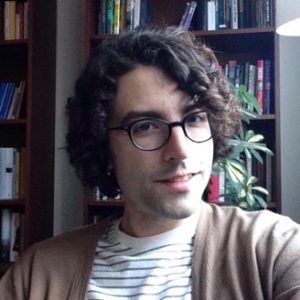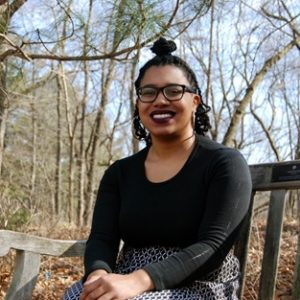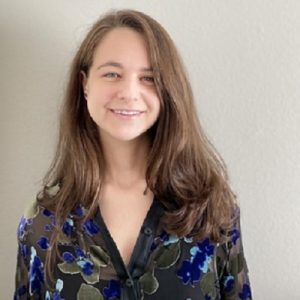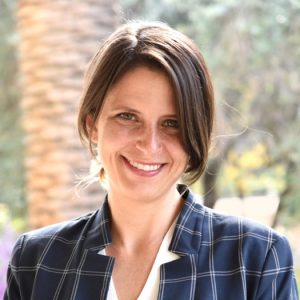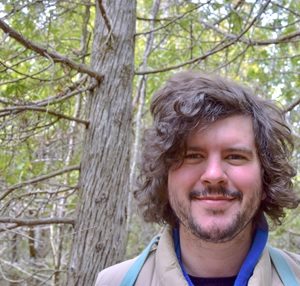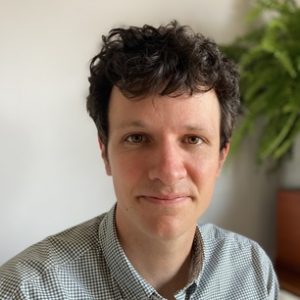Past CES Fellows – Draft
2021-2022 CES Fellows
David Showalter
David Showalter is a doctoral candidate in Sociology at the University of California, Berkeley. Their research addresses topics at the intersection of health, law, and politics, particularly drug use and drug policy, and has been published in International Journal of Drug Policy, Theory & Society, Mobilization, and elsewhere.
David’s dissertation, Going Nowhere: Life with Opioids in Backcountry California, is a multisite ethnographic study of opioid use and opioid-related services in several remote counties. The ongoing overdose crisis has affected communities across the United States, from the largest cities to the most rural areas, but research on opioids has typically focused on urban populations. David uses in-depth interviews and participant-observation fieldwork with people who use drugs, service providers, and local officials to reveal how geographic isolation, scarce resources, and tight-knit social networks in small towns shape drug use and efforts to address its consequences. By combining immersive fieldwork with rigorous social theory, David offers unique insights on the links between place, politics, health, and wellbeing in nonurban settings.
Originally from Oklahoma, David holds a master’s degree in Sociology from UC Berkeley and a bachelor’s degree in Tutorial Studies from the University of Chicago. In addition to their academic work, David serves as President of the Board of Directors for NEED, a harm reduction organization based in Berkeley.
Teona Williams
Teona Williams is a doctoral candidate in History and African American Studies at Yale University. Her work revolves around U.S environmental history, political ecology, race and ethnic studies, environmental justice, digital humanities, and African American history. Her current work explores Black women agrarianism and the struggle for land reparations from the New Deal era to the Black Power Movement.
Before Yale, she completed a master’s degree in Environmental Justice at the University of Michigan Ann Arbor. There she researched how African American college students navigated the outdoor recreational landscape. In 2017, she won the Clyde Woods Prize for best graduate paper in Black Geographies, for her paper "Build A Wall Around Hyde Park: Race, Space and Policing on the Southside of Chicago 1950-2010," which is currently under review for The Antipode. You can access her article on Police Violence and Environmental Justice here.
She is the author of the essay “Islands of Freedom: The struggle to desegregate Shenandoah and Great Smoky Mountain National Park 1936-1941” in the forthcoming edited collection Not Just Green, Not Just White: Race, Justice, Environmental History.
Jennifer Zelnick
Jennifer’s dissertation, “Life and Death After America: Deportee Transnationalism Among Cambodian American Refugees,” examines the deportation process and lifeworlds of deported and deportable Cambodian American refugees. Drawing on over two years of multi-sited transnational ethnographic fieldwork in Cambodia and California, her dissertation challenges extant binaries of migrant il/legality and refugee “deservingness” while simultaneously destabilizing ideas about diasporic belonging, US militarism and empire, and the homeland. Jennifer argues that deportee transnationalism reveals the sociopolitical and legal complexities surrounding declining liberal humanitarianism’s acceptance of refugees, alongside the expansion of the US deportation regime.
Jennifer’s project emerges from deep commitments to research in service of social justice. Her work is grounded in direct service to deportees, deportable refugees, and deportee-serving organizations through pro bono legal and policy support to assist individuals and families fighting deportations.
Jennifer’s work has been supported by the National Science Foundation (#1823363), the Wenner-Gren Foundation for Anthropological Research, the Social Science Research Council International Dissertation Fellowship Program, the Center for Khmer Studies, and the University of California, Irvine (Anthropology Department, Center for Global Peace and Conflict Studies, Center for Asian Studies, and Christian Werner Fellowship). She received her BA in Anthropology from Haverford College, and her MA in Social Sciences from the University of Chicago.
Tiana Wilson
Tiana U. Wilson's broader research interests include Black Women’s Intellectual History, Black Women’s Internationalism, Women of Color Organizing, and Third World Feminism.
Her dissertation, “Liberation for All: Recovering the Lasting Legacy of the Third World Women’s Alliance (TWWA), 1968-2012,” offers the first comprehensive study of the group and traces the intellectual genealogies of a “women of color” feminist praxis rooted in the Women’s Liberation Movement(s) of the 1970s and still used today for political activity. Through an organizational approach, Wilson explores the intellectual history of the TWWA. Wilson’s previous activism with Black women survivors of domestic violence and sexual assault continues to shape her interest in social justice through the lens of intersectionality.
Drawing on political speeches, newsletters, articles, pamphlets, and travel logs, “Liberation for all” examines Black women's contributions to women of color groups in the U.S. from the 1960s to the present. She argues that members’ theorization of the Third World Woman allowed for a successful multiracial feminist coalition that expanded nationally and internationally. By centering working-class women’s issues related to reproductive health, socio-economic disparities, and state violence, the TWWA coalesced Black, Latina, Asian, and Indigenous women under one collective.
At UT, she led the anti-racism committee in her home department, served as the 2019-2020 Graduate Research Assistant for the Institute for Historical Studies, and was a research fellow for the Center for the Study of Race and Democracy between the years of 2017-2020. Her dissertation has been supported by the Sallie Bingham Center; the Carrie Chapman Catt Center for Women and Politics; Smith College Libraries; and the Rapoport Center for Human Rights and Justice, among others.
Liang Wu
To shed light on systematically invisibilized and immobilized seafarers who are the 1.6 million essential workers transporting 90% of world trade including everyday goods and products, Liang Wu has been studying the international shipping industry and seafarers' lives since 2006. Through working at various seafarer centers in Asia and North America, Wu has been directly involved in welfare provision and labor advocacy, and has melded his firsthand experiences in the field with participant observation, carrying out hundreds of ship visits and ethnographic interviews with seafarers as well as representatives of various organizations such as maritime ministries, trade unions, education and training institutes, shipping companies, port authorities, and logistics centers.
With the tentative title of “Contained at Sea: Multinational Seafarers, Mobility Politics, and the International Shipping Industry,” Wu’s dissertation project is situated at the intersection of anthropology, oceanic, critical mobility, and science and technology studies. It examines the meanings and lived experiences of contemporary seamanship, including the techno economic, infrastructural, and legal developments of shipping in the postwar era, the concomitant changing society and culture of port cities and shipboard communities, politics of mobility generated by the global expedition of materials, and the mechanisms and mediations through which multinational seafarers navigate their overseas relationships, job conditions, state administrations, and international law such as maritime security and environmental protection.
At the dawn of what is touted as the 4th Industrial Revolution that prioritizes technological communication, connectivity, and circulation, Wu’s work on seafarers as vanguard transport workers not only serves as a reference for other laborers of material delivery and social sustenance in the larger US society, but also offers critical insights into the future of labor conditions and industrial relations that undergird logistical processes of societies and economies around the globe.
Justine Modica
Justine Modica is a PhD candidate in U.S. History at Stanford University, and a PhD minor in Feminist, Gender, and Sexuality Studies. She researches the history of women's labor and care work in the 20th century.
Her dissertation is a historical analysis of child care as a labor issue. The United States experienced a dramatic growth in maternal labor force participation in the second half of the twentieth century but remains one of the only industrialized nations without a comprehensive approach to child care.
Justine's dissertation examines how various groups of Americans built and shaped a waged child care workforce to replace the unwaged labor of mothers caring for children in the home. She examines this history on the levels of both grassroots action and governmental policy, exploring how the approaches of workers, families, municipal governments, federal agencies, and labor unions intersected. Central to her study are the ways that ideologies and practices of race, gender, class, and citizenship shaped the demographics of the childcare workforce, conditions of employment, and the social and monetary value of caring labor.
Justine holds an MA in History from Stanford University and a BA in History from Dartmouth College.
2022-2023 Honorable Mentions
We are pleased that each of this year’s honorable mentions was able to gain support for their work from another source.
Elan Pochedley
Elan Pochedley is a PhD candidate in the Department of Anthropology at the University of Minnesota-Twin Cities, where he has earned dual graduate minors in American Indian & Indigenous Studies (AIIS) and Heritage Studies & Public History (HSPH). He is an enrolled member of the Citizen Potawatomi Nation.
Elan’s dissertation, “Contemporary Neshnabék Territoriality: A Study of Connections and Obligations to Waters, Lands, and Nonhuman Relatives,” analyzes how obligations to nonhuman relatives, popularly categorized as “natural resources,” are actively practiced by Potawatomi and Ojibwe nations. In this multi-sited ethnography, Elan collaborated and conducted ethnographic research with four sovereign Neshnabék nations: the Citizen Potawatomi Nation, the Match-E-Be-Nash-She-Wish Band of Pottawatomi, the Nottawaseppi Huron Band of the Potawatomi, and the White Earth Nation (Ojibwe).
By studying these nations’ obligations to nonhuman relatives alongside their present-day territorial claims, his dissertation is comprised of relational analyses of environmental ethics across Neshnabék nations, reservations, and homelands typically perceived as isolated from one another. Elan studies how these nations navigate emerging technologies, legal approaches, and U.S.-sponsored ecological restoration projects while maintaining specific ethical commitments. His research investigates Potawatomi and Ojibwe nations’ efforts to restore wild rice, rehabilitate eagles and sturgeon, protect bodies of water, and contest infrastructure projects that threaten the health and livelihoods of their human and nonhuman kin. This ethnographic research was conducted with the consent and approval of these nations’ respective tribal councils and/or research review boards.
As the Research Fellow in Geography and Cartography at the Citizen Potawatomi Nation’s Cultural Heritage Center, he is currently utilizing ArcGIS software to spatially map historic Potawatomi homelands, presences, inter-species relational networks, and place names in Indiana. The resulting maps are the basis for an article he recently authored for the Open Rivers: Rethinking Water, Place & Community journal.
His dissertation research has been supported by the National Science Foundation Graduate Research Fellowship Program (NSF GRFP), the Mellon Foundation, the University of Minnesota Diversity of Views & Experiences (DOVE) Fellowship, and the Beverly & Richard Fink Summer Research Fellowship. He recently accepted the Charles Eastman Fellowship at Dartmouth College, which he will begin in the fall of 2021. In 2016, he received his B.A. in Native/Indigenous Studies (Ethnicity & Race Studies) from Columbia College, Columbia University, where he served as Co-President of the Native American Council and was a recipient of the Mellon Mays Undergraduate Fellowship (MMUF).
Sabrina Dycus
Sabrina’s research interests include law and society, the sociology of expertise, and social theory. Sabrina’s dissertation research uses qualitative and quantitative data (observations, interviews, archival analysis, and a large administrative database) to understand immigration removal proceedings as sites of state social control. Immigration removal proceedings are the primary mechanism that state actors use to deport people, and people undergo the same process whether an immigration judge ultimately orders them deported or not.
Sabrina’s dissertation will deepen our understanding of the state’s social control capacity vis-à-vis its immigration law and enforcement apparatus. Additionally, executive branch court proceedings are understudied in the literature (immigration courts are located within the U.S. Department of Justice). Providing an interior account of how immigration court proceedings operate as modes of state social control is an important step towards understanding how courts throughout the federal executive branch—around 450 in total—extend the state’s social control capacity deeper into our lives.
Sabrina has a master’s degree in public administration from the Harvard Kennedy School and a JD from Yale Law School. Before beginning graduate school, Sabrina practiced law for a number of years. Sabrina is the proud daughter of Haitian immigrants and mother to three young children. She lives in New York City.
Yoav Hamdani
Yoav Hamdani is a PhD candidate at Columbia University History Department, where he studies violence, slavery, and military history. His principal focus is the intersections between territorial expansion, slavery, Native-American removal, resistance, and military violence.
His dissertation, Uncle Sam’s Slaves: Slavery in the United States Army 1797-1865, reveals the history of military slaves in the first decades of the American Republic. The dissertation argues that thousands of enslaved persons served as officers’ servants, becoming an integral part of the U.S. Army.
By probing the history of military slaves, Hamdani demonstrates how the “Old Army,” the key instrument of statecraft in the early United States, evolved as a national institution that condoned and promoted slavery in its ranks. The dissertation investigates the origins of slavery within the army, the political economy of military slavery as well as the legal, fiscal, and violent mechanisms that sustained it, and the ways in which it influenced the lives of slaves and soldiers. It emphasizes the national dimension of slavery and the government’s commitment to it, by unearthing the role of previously unregarded men and women in the nation’s military history and their involuntary participation in the building of an American Continental Empire.
Originally from Ashdod, Israel, Yoav graduated from Tel-Aviv University’s Multidisciplinary Honors B.A. Program in Humanities and Arts. He started his studies at Columbia University in 2015.
Brian Walter
Brian’s research explores how the impacts of climate-change-driven sea-level rise are compounded and racialized by infrastructure and heritage preservation in the South Carolina Lowcountry.
The Lowcountry is a region shaped by two histories: slavery and the tidal flow of water. With four consecutive years of hurricanes and 89 days of tidal flooding in Charleston in 2019, the Lowcountry’s relationship with the ebb and flow of the tides has become central in a new way, as a harbinger of future destruction. As local governments forge new tidal relations by building and adapting infrastructure, the preservation of antebellum heritage landscapes and everyday flooding of Black communities reveal enduring racial geographies. While officials in city meetings argue that “water knows no boundaries,” residents understand that the infrastructures underpinning the dispersal and management of floodwater enact a racialized politics of emplacement, inclusion, and exclusion.
Brian’s research is situated in this and other spaces where global climate change and water infrastructure become entangled with what Saidiya Hartman calls the afterlife of slavery. His dissertation offers new formulations of coastal resiliency and provides empirical support for local environmental justice organizations in their urgent claims for reparative flood mitigation.
Brian’s research is based on 15 months of ethnographic fieldwork and collaborative community-led research with Charleston flood activist groups.
He received his B.A. in Anthropology and Philosophy from the Honors College at the University of Georgia, and his M.A. in Cultural Anthropology from the University of California, Santa Cruz.
Samuel Maull
Sam’s dissertation, Carceral Logics: Race, Responsibility, and Family in a San Francisco Jail, is one of the only ‘prison ethnographies’ to have been conducted in the US in half a century. Sam’s work investigates the intersection of anti-blackness, responsibility, kinship, and carcerality and emerges from 3 years of ethnographic research with incarcerated people and the families of incarcerated people in the San Francisco Bay Area.
Approaching incarceration from the perspective of families with incarcerated members de-centers the presumptively male subject of carceral violence and instead shows us the networks through which penal harm are transmitted across intimate relationships and broader communities. It also highlights the ways that discourses of family failure and dysfunction, ubiquitous in the criminal justice system, have positioned black families as responsible for the incarceration of their own kin.
His commitments to abolitionist movements ground Sam’s work. Originally from the UK, Sam studied anthropology at UCL before moving to the US to complete his dissertation at Stanford.
An experienced teacher and organizer, his work has been supported by the Center for Comparative Study of Race and Ethnicity, the Clayman Institute for Gender Research, the Wenner Gren Foundation, and others.
